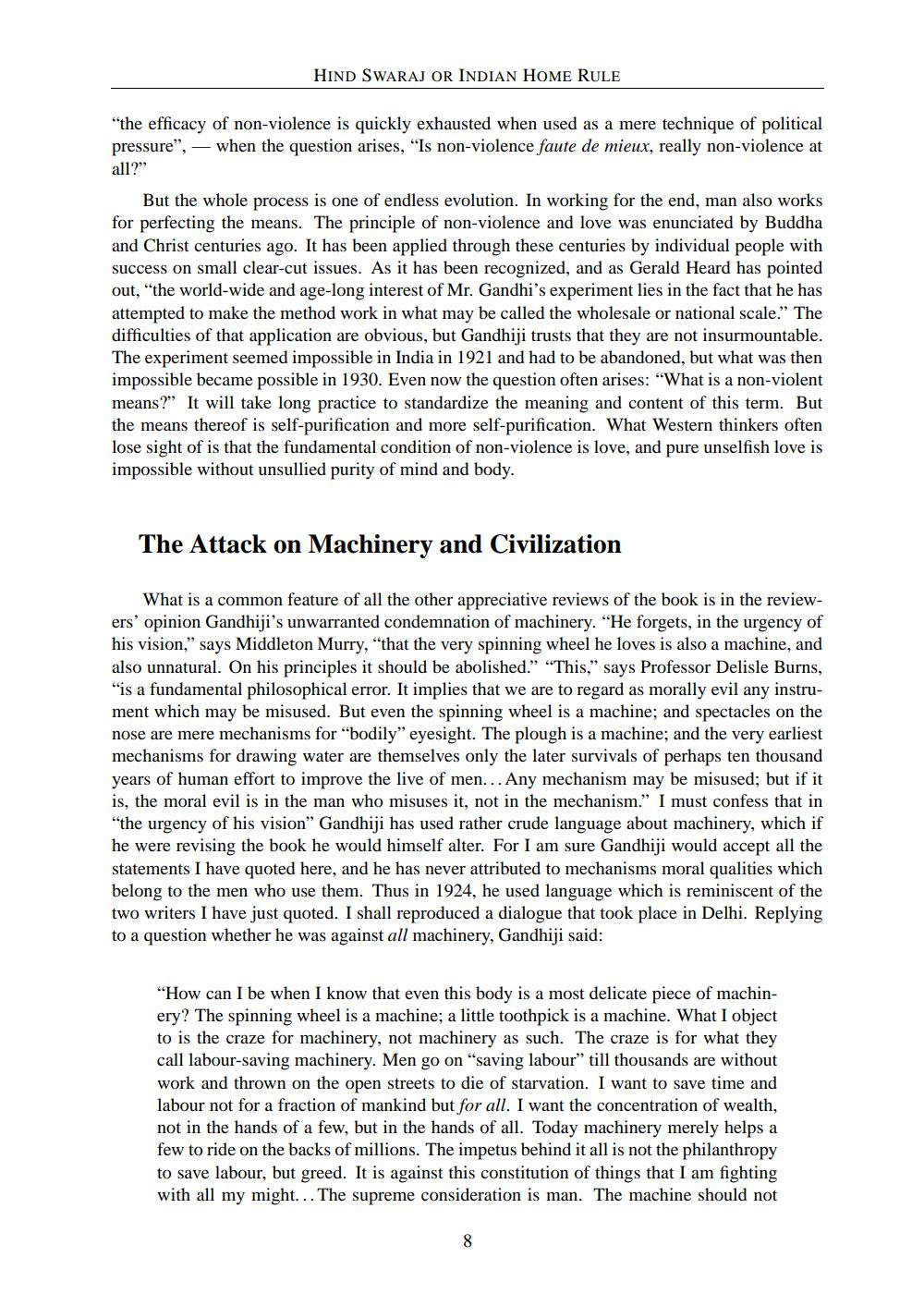Book Title: Indian Home Rules Gandhiji Author(s): Mohandas Karamchand Gandhi, Gandhiji Publisher: Yann Forget View full book textPage 8
________________ HIND SWARAJ OR INDIAN HOME RULE "the efficacy of non-violence is quickly exhausted when used as a mere technique of political pressure", - when the question arises, "Is non-violence faute de mieux, really non-violence at all?" But the whole process is one of endless evolution. In working for the end, man also works for perfecting the means. The principle of non-violence and love was enunciated by Buddha and Christ centuries ago. It has been applied through these centuries by individual people with success on small clear-cut issues. As it has been recognized, and as Gerald Heard has pointed out, "the world-wide and age-long interest of Mr. Gandhi's experiment lies in the fact that he has attempted to make the method work in what may be called the wholesale or national scale." The difficulties of that application are obvious, but Gandhiji trusts that they are not insurmountable. The experiment seemed impossible in India in 1921 and had to be abandoned, but what was then impossible became possible in 1930. Even now the question often arises: "What is a non-violent means?" It will take long practice to standardize the meaning and content of this term. But the means thereof is self-purification and more self-purification. What Western thinkers often lose sight of is that the fundamental condition of non-violence is love, and pure unselfish love is impossible without unsullied purity of mind and body. The Attack on Machinery and Civilization What is a common feature of all the other appreciative reviews of the book is in the reviewers' opinion Gandhiji's unwarranted condemnation of machinery. "He forgets, in the urgency of his vision," says Middleton Murry, "that the very spinning wheel he loves is also a machine, and also unnatural. On his principles it should be abolished." "This," says Professor Delisle Burns, "is a fundamental philosophical error. It implies that we are to regard as morally evil any instrument which may be misused. But even the spinning wheel is a machine; and spectacles on the nose are mere mechanisms for "bodily" eyesight. The plough is a machine; and the very earliest mechanisms for drawing water are themselves only the later survivals of perhaps ten thousand years of human effort to improve the live of men... Any mechanism may be misused; but if it is, the moral evil is in the man who misuses it, not in the mechanism." I must confess that in "the urgency of his vision" Gandhiji has used rather crude language about machinery, which if he were revising the book he would himself alter. For I am sure Gandhiji would accept all the statements I have quoted here, and he has never attributed to mechanisms moral qualities which belong to the men who use them. Thus in 1924, he used language which is reminiscent of the two writers I have just quoted. I shall reproduced a dialogue that took place in Delhi. Replying to a question whether he was against all machinery, Gandhiji said: "How can I be when I know that even this body is a most delicate piece of machinery? The spinning wheel is a machine; a little toothpick is a machine. What I object to is the craze for machinery, not machinery as such. The craze is for what they call labour-saving machinery. Men go on "saving labour" till thousands are without work and thrown on the open streets to die of starvation. I want to save time and labour not for a fraction of mankind but for all. I want the concentration of wealth, not in the hands of a few, but in the hands of all. Today machinery merely helps a few to ride on the backs of millions. The impetus behind it all is not the philanthropy to save labour, but greed. It is against this constitution of things that I am fighting with all my might... The supreme consideration is man. The machine should not 8Page Navigation
1 ... 6 7 8 9 10 11 12 13 14 15 16 17 18 19 20 21 22 23 24 25 26 27 28 29 30 31 32 33 34 35 36 37 38 39 40 41 42 43 44 45 46 47 48 49 50 51 52 53 54 55 56 57 58 59 60 61 62 63 64 65 66 67 68 69 70 71 72 73 74 75
